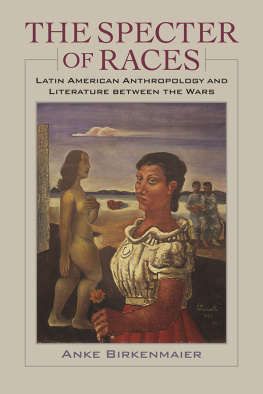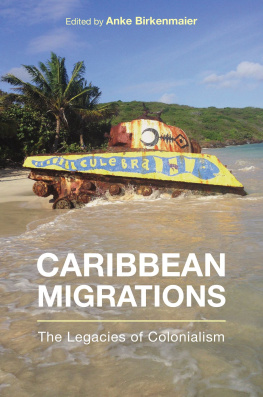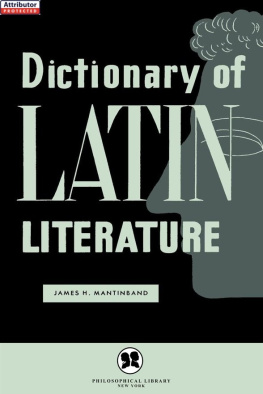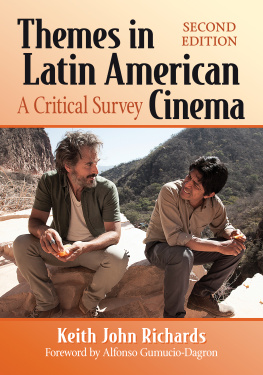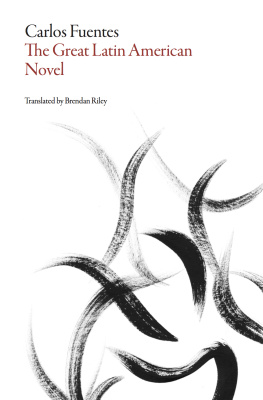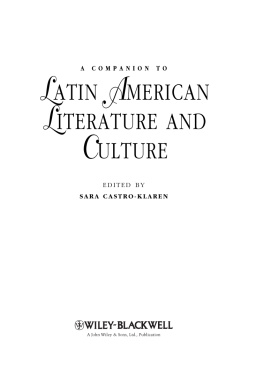Anke Birkenmaier - The Specter of Races: Latin American Anthropology and Literature Between the Wars
Here you can read online Anke Birkenmaier - The Specter of Races: Latin American Anthropology and Literature Between the Wars full text of the book (entire story) in english for free. Download pdf and epub, get meaning, cover and reviews about this ebook. year: 2016, publisher: University of Virginia Press, genre: Art. Description of the work, (preface) as well as reviews are available. Best literature library LitArk.com created for fans of good reading and offers a wide selection of genres:
Romance novel
Science fiction
Adventure
Detective
Science
History
Home and family
Prose
Art
Politics
Computer
Non-fiction
Religion
Business
Children
Humor
Choose a favorite category and find really read worthwhile books. Enjoy immersion in the world of imagination, feel the emotions of the characters or learn something new for yourself, make an fascinating discovery.
- Book:The Specter of Races: Latin American Anthropology and Literature Between the Wars
- Author:
- Publisher:University of Virginia Press
- Genre:
- Year:2016
- Rating:3 / 5
- Favourites:Add to favourites
- Your mark:
- 60
- 1
- 2
- 3
- 4
- 5
The Specter of Races: Latin American Anthropology and Literature Between the Wars: summary, description and annotation
We offer to read an annotation, description, summary or preface (depends on what the author of the book "The Specter of Races: Latin American Anthropology and Literature Between the Wars" wrote himself). If you haven't found the necessary information about the book — write in the comments, we will try to find it.
The Specter of Races: Latin American Anthropology and Literature Between the Wars — read online for free the complete book (whole text) full work
Below is the text of the book, divided by pages. System saving the place of the last page read, allows you to conveniently read the book "The Specter of Races: Latin American Anthropology and Literature Between the Wars" online for free, without having to search again every time where you left off. Put a bookmark, and you can go to the page where you finished reading at any time.
Font size:
Interval:
Bookmark:
Acknowledgments
THIS PROJECT took shape over a number of years, and many institutions and people have assisted me generously with aspects of my research and thought process.
In Havana, I want to thank Araceli Garca Carranza and Ileana Ortega at the Biblioteca Nacional Jos Mart, who guided my search through Fernando Ortizs archive, as well as Jos Doll Prez. At the Instituto de Literatura y Lingustica, Cira Romero made the impossible possible and introduced me to the Cuban scholars Sergio Valds Bernal and Patricia Motorola and to Jos A. Matos Arvalos, from the Fernando Ortiz Foundation. In Paris, I was fortunate to have office space at Reid Hall, with the wonderful Mihaela Bacou. In Paris, too, I consulted the Paul Rivet Archive at the Musum dHistoire Naturelle and at the Bibliothque du Muse de lHomme, which at that point had closed already, and where I was assisted by Adrien Mattatia. Im particularly grateful to Christine Laurire, now at the CNRS, for her expertise and generous orientation in all matters concerning Paul Rivet. At the Laboratoire dAnthropologie Sociale I am grateful for having been able to consult the Fonds Alfred Mtraux and even to have had a brief conversation with Claude Lvi-Strauss. In Mexico at the Colegio de Mxico, Clara E. Lida and Andrs Lira shared their knowledge on anthropology, literature, and European exiles in Mexico, and Adolfo Castan took time to talk about Roger Caillois. Sibylle Fischer introduced me to Jean Casimir, who opened doors for me in Port-au-Prince in 2008; in Haiti I also thank Rachelle Doucet, Suze Mathieu, and Rachelle Beauvoir-Dominique and the staff of the Bibliothque Haitienne des Frres de linstruction chrtienne and at the Petit Seminaire of the Collge Saint-Martial for letting me consult their collection. My Brazilianist colleagues at Indiana University, Darlene Sadlier and Luciana Namorato, gave me important feedback and recommended additional bibliographic works. Finally, the Schomburg Center for Research in Black Culture in New York offered all the resources that I had not been able to find in Haiti, Cuba, or Brazil, and it has been a privilege to work there.
My research travels were made possible by three generous field research grants from the Institute of Latin American Studies at Columbia University, under the directorship of Thomas Trebat and then Pablo Piccato. Much of the writing and rewriting was done during junior faculty leaves from Columbia University and from Indiana University.
Im grateful for conversations with colleagues at Columbia University, in particular Vincent Debaene, Maja Horn, Alfred MacAdam, Gustavo Prez Firmat, Pablo Piccato, and Alessandra Russo, and at Indiana University with Deborah Cohn, Melissa Dinverno, Patrick Dove, Lessie Joe Frazier, Ilana Gershon, Edgar Illas, Eden Medina, Alejandro Mejas-Lpez, Kate Myers, John Nieto-Philips, Estela Vieira, and Steve Wagschal. Also at Indiana University, I received assistance from my undergraduate research assistant, Rachel Colegrove, and from graduate assistants Olivia Holloway Salzano, who took care of translations from Portuguese into English, and Krista Weirich.
My friends Rubn Gallo, Jacqueline Loss, Viviane Mahieux, and Rafael Rojas listened and commented on versions of this project; Viviane in particular was a great friend in all walks of life and a patient reader of a number of chapter drafts. Parts of the project were presented at the Caribbean Studies Group of New York University, Brown University, the Universit dEtat dHati in Port-au-Prince, and the Annual Meeting of the American Comparative Literature Association in Providence, at a seminar hosted by Charlotte Rogers.
I am deeply appreciative also of the comments that I received on the entire manuscript from Emily Maguire of Northwestern University, and from two anonymous readers. They all have contributed to making this book much better, even though its flaws are, of course, still mine. I also thank my editors at the University of Virginia Press, Cathie Brettschneider and Eric Brandt, for their expertise and decisiveness, as well as Ellen Satrom and Mark Mones.
Finally, my parents in Germany and my partner, Roman, have been like rocks in my life, and I thank them for having stayed with me, all the way.
Bibliography
Actas de la Sociedad del folklore cubano. No. 1. Archivos del Folklore Cubano 1.1 (1923): 7779.
A. W. Glosario de Afronegrismos by Fernando Ortiz. Journal of the Royal African Society 25.97 (1925): 1034.
Abelln, Jos Luis. La idea de Amrica. Origen y evolucin. 1972. Madrid: Iberoamericana, Vervuert, 2009.
Adorno, Rolena. Havana and Macondo: The Humanities in U.S. Latin American Studies, 19402000. The Humanities and the Dynamics of Inclusion since World War II. Ed. David A. Hollinger. Baltimore: Johns Hopkins UP, 2006. 372405.
. Racial Scorn and Critical Contempt. Diacritics 4.4 (1974): 27.
Aguirre Beltrn, Gonzalo. Problema, mtodo y teora en los estudios afroamericanos, segn Melville J. Herskovits. Afroamrica 2.3 (1946): 18796.
. El proceso de aculturacin. Mexico: Universidad Nacional Autnoma de Mxico. Direccin general de publicaciones, 1957.
Alberto, Paulina. Democracy: So Paulo and Rio de Janeiro, 19451950. Terms of Inclusion: Black Intellectuals and the Politics of Belonging in Twentieth-Century Brazil. Charlotte: U of North Carolina P, 2011. 15195.
Altamira, Rafael. Mi viaje a Amrica (libro de documentos). Madrid: Librera general de Victoriano Surez, 1911.
Andermann, Jens. The Optic of the State: Visuality and Power in Argentina and Brazil. Pittsburgh: U of Pittsburgh P, 2007.
Anderson, Benedict. Imagined Communities: Reflections on the Origins and Spread of Nationalism. 1983. Rev. ed. London and New York: Verso, 1991.
Anderson, Mark D. From Natural to National Disasters: Drought and the Brazilian Subject in Euclides da Cunhas Os Sertes. Hispania (USA) 91.3 (2008): 54757.
Andrews, George Reid. Brazilian Racial Democracy, 19001990: An American Counterpoint. Journal of Contemporary History 31.3 (1996): 483507.
Anonymous. Revista de Libros. Lorimer Denis et Francois Duvalier, Evolution stadiale du vodou. Bulletin no. 3 du Bureau d Ethnologie de la Republique d Hati. Port-au-Prince, 1944. Afroamrica 2.3 (1946): 15051.
Antoine, Jacques Carmeleau. Jean Price-Mars and Haiti. Washington, D.C.: Three Continents, 1981.
Arroyo, Jossianna. Travestismos culturales: literatura y etnografa en Cuba y en Brasil. Pittsburgh: U of Pittsburgh, Instituto Internacional de Literatura Iberoamericana, 2003.
Avelar, Idelber. Cenas dizveis e indizveis: Raa e sexualidade em Gilberto Freyre. Luso-Brazilian Review 49.1 (2012): 16886.
Azevedo, Thales de. Democracia racial. Ideologia e realidade. Petrpolis: Editora Vozes, 1975.
Barfield, Thomas. The Dictionary of Anthropology. Malden and Oxford: Blackwell, 1997.
Barkan, Elazar. The Retreat of Scientific Racism: Changing Concepts of Race in Britain and the U.S. New York: Cambridge UP, 1992.
Barreal, Isaac. Prlogo. Etnia y sociedad. Fernando Ortiz. Ed. Isaac Barreal. Havana: Editorial de Ciencias Sociales, 1993. viixxxiii.
Barros, Luitgarde Oliveira Cavalcanti. Arthur Ramos e as dinmicas sociais de seu tempo. 2nd ed. Macei: Universidade Federal de Alagoas, 2005.
Bastien, Rmy Auguste. Anthologie du folklore haitien. Acta Anthropologica. Mexico, 1946.
. Rapport annuel du Bureau dethnologie de la Rpublique dHaiti. Portau-Prince: Bureau dethnologie, 1943.
Bataille, Georges. Muse. Documents 2 (1930): 300. Paris: Jean-Michel Place, 1991.
Bataillon, Francoise. LIFAL de 1945 a 1964. IFAL 19451985. Ed. Claude Bataillon and Georges Couffignal. Mexico City: Instituto Francs de Amrica Latina, 1986. 2160.
Next pageFont size:
Interval:
Bookmark:
Similar books «The Specter of Races: Latin American Anthropology and Literature Between the Wars»
Look at similar books to The Specter of Races: Latin American Anthropology and Literature Between the Wars. We have selected literature similar in name and meaning in the hope of providing readers with more options to find new, interesting, not yet read works.
Discussion, reviews of the book The Specter of Races: Latin American Anthropology and Literature Between the Wars and just readers' own opinions. Leave your comments, write what you think about the work, its meaning or the main characters. Specify what exactly you liked and what you didn't like, and why you think so.

